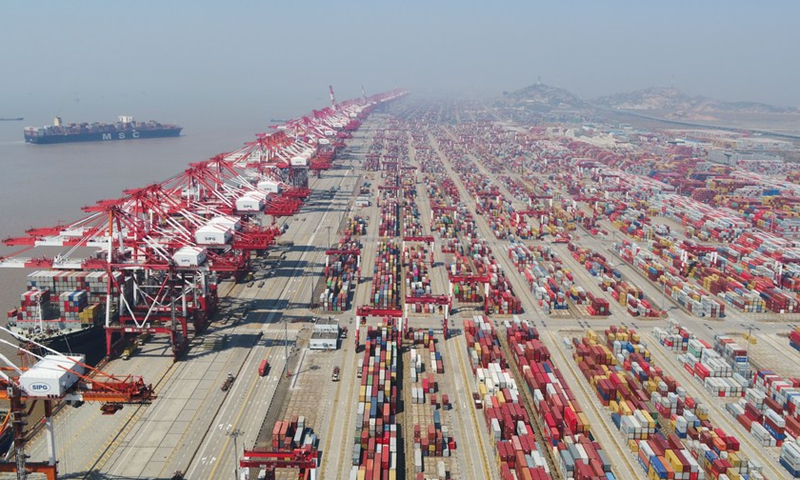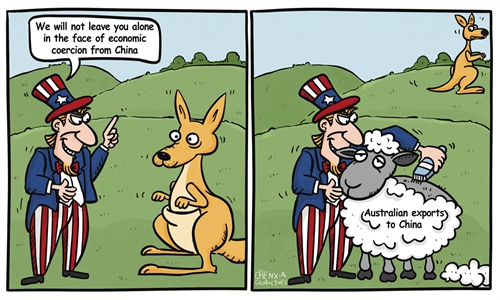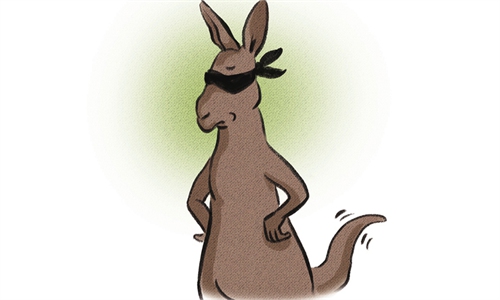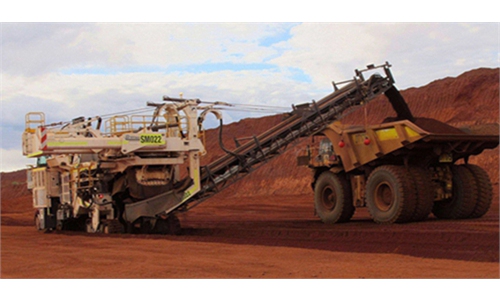China sends global commodity prices down; Australian iron ore exports hit hard
Runaway market threatens hard-fought economic recovery: economists

Aerial photo shows the container dock of Shanghai's Yangshan Port, east China.(Photo: Xinhua)
Industrial commodity prices extended sharp losses on Monday both in China and abroad, after officials in China, the world's factory floor and largest consumer of raw materials, intensified a top-down campaign to rein in runaway prices that have already exerted pressure on factories and businesses and further threaten to derail China's hard-fought economic recovery from the COVID-19 pandemic.
The latest effort by Chinese officials to further step up the crackdown on what they call excessive speculation in the commodity markets came after repeated warnings and actions by local governments and industry bodies over the past several weeks failed to bring prices down to a "reasonable" range, and risks posed by the soaring prices for the Chinese economy continue to emerge, analysts noted. In a rare step, five Chinese agencies on Sunday warned leading companies not to engage in price gouging.
Further highlighting China's commitment to tackling soaring commodity prices, Premier Li Keqiang on Monday inspected a major port in Ningbo, East China's Zhejiang Province on Monday and heard reports on trend in global commodity prices.
During the tour, Li also highlighted the impact of high commodity prices on factories and asked the port to improve import and storage operations, according to an official statement.
While China's efforts are aimed at stabilizing the domestic commodity markets to stave off potential risks, they could also help end a months-long rally in global commodity prices, analysts said. Major suppliers, particularly Australia - which has enjoyed record-high prices for its main export to China, iron ore, despite losses in other trade--could feel the pain, they added. Australia's days of "profiteering" may be marked, an expert said.
China crackdown
Global and domestic commodity markets already took a cue from China's broadening crackdown. On Monday, prices for most commodity futures fell sharply in China, led by an over 5 percent drop for iron ore. Prices of several other commodity futures, including hot-rolled coil, declined by over 3 percent. Global industrial metal prices also declined on Monday, with three-month copper prices on London's metal exchange were down 0.3 percent and aluminum dropping 2.3 percent, according to Reuters.
The extended losses on Monday followed the latest signal from Chinese officials that they are stepping up efforts to rein in soaring commodity prices. On Sunday, the National Development and Reform Commission (NDRC), the top economic planner, along with four other departments held a meeting with industry leaders and vowed to severely punish excessive speculation, price gouging and other violations that helped lift prices.
Regulators would adopt a "zero tolerance" toward illegal activities and strengthen regulation of abnormal transactions and malicious speculation, the NDRC said in a statement.
The move came after the State Council, China cabinet, paid special attention to rising commodity prices in two back-to-back executive meetings, calling for effective measures to stabilize commodity markets. The intensified efforts also followed earlier warnings and efforts by some local authorities and industry bodies which failed to bring down prices, leading to intensified efforts from higher authorities.
"With the world's largest manufacturing sector, China has been bearing the brunt of soaring raw material prices. The impact on the real economy is very significant, with companies and consumers set to be hurt," Liu Xuezhi, a senior macroeconomic analyst at Bank of Communications, told the Global Times on Monday, adding that nothing less than China's hard-fought economic recovery from the COVID-19 is at stake.
Soaring raw material prices have already dramatically pushed up costs for many factories, particularly small and medium-sized businesses. There have also been increasing signs that rising raw material prices could push up consumer prices, as some companies raised prices for a wide range of products, including refrigerators, washers and bicycles, citing rising costs.
In April, factory-gate prices in the country surged 6.8 percent year-on-year, the fastest pace in over three years, raising concerns that high raw material prices could dampen the economic recovery and push up consumer prices.
That rising raw material prices threaten China's main growth drivers and pose serious risks to economic recovery spurred a series of efforts by top officials, experts noted. Warning signs of global inflation, particularly from the US, which could also seriously impact China's economic operations, also added urgency to Chinese officials to act swiftly, the experts added.
"Rising commodity prices have affected many aspects of people's daily life," Ren Zeping, dean of the Evergrande Research Institute, said in an interview, noting that while a global economic recovery has pushed up demand for commodities and in turn lifted prices, the main reason behind the price surge lies on the supply side and market speculation. For example, COVID-19 pandemic in major suppliers such as Brazil and India also squeezed supplies, Ren noted.
While commodity prices are set by the global market, as the world's largest consumer, China's crackdown on speculations and other market manipulation could also send chilling waves across the globe, experts said.
"Certainly, China's actions will have a significant impact on global commodity prices," particularly exports that rely heavily on China's demand, Liu said.
Australia's pain
Among the most affected could be iron ore exports from Australia, which has benefited massively from the sky-high prices in its main export - emboldening officials in Canberra to continue on their relentless provocation against China.
"Due to unreasonable global iron ore prices, Australia's iron ore exporters have profited greatly. However, such profiteering will not last very long," Chen Hong, a professor and director of the Australian Studies Center at East China Normal University, told the Global Times on Monday.
Australia is the world's largest iron ore producer and the largest supplier of China. In the first four months of the year, China imported 229 million tons of iron ore from Australia, or nearly 60 percent of its total imports, according to Wang Guoqing, research director at the Beijing Lange Steel Information Research Center.
That has singlehandedly helped save Australia's trade amid tense relations with China that has impacted trade in many areas, according to experts and media reports. In April, for example, China's imports from Australia rose by over 49.3 percent, mainly because of high iron ore prices.
While China's reliance on Australian iron ore will likely continue in the foreseeable future, despite its efforts to diversify sources, sharp drops in iron ore prices would mean heavy losses in export revenue for Australia, which is already seeing declining trade with China in areas such as wine and seafood, experts noted.
For example, iron ore prices fell by about $9.25 per ton last week following the State Council meeting; that could translate into a loss of over $2 billion in extra revenue for Australia based on the amount of exports to China in the first four months of 2021. If prices fell from about $200 per ton last week to about $60 per ton during the same time last year, losses in revenue could have been over $32 billion.
Reflecting the potential impact on Australian iron ore exports to China, shares prices of main Australian iron ore producers fell on Monday following China's latest efforts to rein in prices. Shares of Rio Tinto in Australia fell by 1.46 percent on Monday, while BHP Group's shares dropped by 1 percent.
In addition to the impact from declining prices, China's reliance on Australian iron ore will decline over time, as the country moves to expand sources of supplies, experts said.
"China's diversifying import system will have the key impact on the reduction of China's imports of Australian iron ore," Wang told the Global Times on Monday, noting Australia iron ore's proportion of China's total import is already declining slightly.
Australia's proportion of China's iron ore imports dropped below 60 percent for the first time in the first four months of 2021 and as China continues to diversify supplies, this could further drop to below 50 percent in the next few years, experts said.





